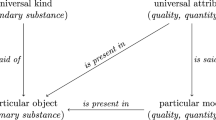Abstract
Traditionally, the so-called exemplification or the relation between the particular and the universal has been one of the three central problems making up the classical problem of universals: (1) What is a particular? (2) What is a universal? (3) What is the relation between the particular and the universal? I used the expression “classical problem of universals” instead of “the problem of universals” since the classical formulation of the problem could be said to contain a questionable assumption, namely that substance should be the bearer “in” which are the entities of (other) categories. Under these circumstances, a neutral approach to the problem of universals could consist in reformulating the three problems of the classical problem as follows: (4) What is the fundamental bearer of categories? (5) What categories are there? (6) What is the relation between the fundamental bearer and the categories? My purpose in this paper is to answer the latter three questions. In order to accomplish this task, I shall discuss the views of two leading figures in substance-ontology, Aristotle and Jonathan Lowe, and the views of two leading figures in fact-ontology, Gustav Bergmann and Reinhardt Grossmann. I shall answer the first question by claiming that the fundamental bearer of categories is facts; the second, by pointing out that it depends on the answer to the previous one; and the third, by showing that the relation between the fundamental bearer and the categories is the one between facts and its constituents, not between a substance or particular and its accidents or properties. In this connection, I shall argue that the “in” of property exemplification should be categorially reconstructed in order for entities other than properties, say, particulars, relations, connectives, numbers, and even facts, to be “in” facts. This categorial reconstruction will also argued for with respect to the Principle of Exemplification.
Similar content being viewed by others
Notes
This point was made to me by Peter Simons while we were preparing the contents of the Call for Papers of our special issue Categories for “The Monist”. (J. Cumpa & P. Simons, Categories. Special Issue of The Monist, 98/3 July, 2015).
For epistemological details about this rejection of possible worlds, see Cumpa (2011), pp. 25–29, and 63–65.
Aristotle (1963), 2a11.
Aristotle, (1963), 2a34.
Lowe (2006), p. 21.
Lowe (2006), p. 109.
Lowe (2006), p. 36.
Lowe (2006), p. 37.
Lowe (2006), p. 39.
Grossmann (1992), p. 73 ff.
Bergmann (1967/2004), p. 6 ff.
Bergmann (1967/2004), p. 12.
Grossmann (1983), p. 132.
Bergmann (1967/2004), p. 43.
Bergmann (1967/2004), p. 360.
Grossmann (1990), p. 200.
Cumpa (2012).
References
Aristotle (1963) “Categories”. In: Categories and De Interpretatione. Clarendon Press, Oxford (edited and translated by Ackrill JL)
Bergmann G (1967/2004) Realism: a critique of Brentano and Meinong. Ontos Verlag, Frankfurt
Cumpa J (2011) Categoriality: three disputes over the structure of the world. In: Cumpa J, Tegtmeier E (eds) Ontological categories. Ontos Verlag, Frankfurt, pp 15–65
Cumpa J (2012) A transcendental “in”: the molecular theory of exemplification. In: Nef F, Rebuschi M, Schneider L (eds) The ontology of relations: material, formal, and transcendental, Ontos Verlag (forthcoming)
Grossmann R (1983) The categorial structure of the world. Indiana University Press, Bloomington
Grossmann R (1990) The fourth way: a theory of knowledge. Indiana University Press, Bloomington
Grossmann R (1992) The existence of the world: an introduction to ontology. Routledge and Kegan Paul, London
Lowe EJ (2006) The four-category ontology: a metaphysical foundation for natural science. Clarendon Press, Oxford
Acknowledgments
The present work was presented as one of two invited papers at the international workshop “Exemplification” at the University of Geneva (Switzerland, June 10, 2011), organized by Philipp Keller and Eidos: The Centre in Metaphysics of The University of Geneva. I am very grateful to the organizer, Howard Peacock, Fabrice Correia, Mark Textor, and Adrián Dufour who presented valuable replies. I want to also thank Boris Pantev, Roberto Poli and two anonymous referees of this journal (Axiomathes) for commenting on a previous version of this paper.
Author information
Authors and Affiliations
Corresponding author
Rights and permissions
About this article
Cite this article
Cumpa, J. “In One”: The Bearer Issue and the Principles of Exemplification. Axiomathes 23, 201–211 (2013). https://doi.org/10.1007/s10516-012-9192-1
Received:
Accepted:
Published:
Issue Date:
DOI: https://doi.org/10.1007/s10516-012-9192-1




